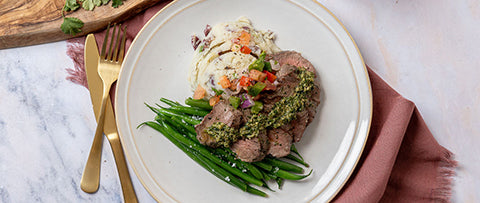Do you have a picky eater who refuses to eat anything other than chicken nuggets? Or maybe your kiddo is just not interested in eating much at all. If eating healthy at mealtime is a constant battle at home, you are not alone!
Many parents worry whether or not their kids are getting the proper nutrients and struggle to get their little ones to eat healthy. What we feed our kids is important and has a huge impact on their physical, mental, and emotional health.

What we feed our kids impacts their physical, mental, and emotional health.
Recommended Daily Intake
Your kids need the same types of nutrients that you need; vitamins, minerals, carbohydrates, protein, and fat. However, they do need different amounts of specific nutrients based on their ages. Below are examples of some nutrition basics for boys and girls based on their ages from the US Department of Health & Human Services’ Dietary Guidelines for Americans.
Ages 2 to 3: Daily intake for girls and boys
|
Calories |
1,000-1,400 |
|
Protein |
2-4 ounces |
|
Fruits |
1-1.5 cups |
|
Vegetables |
1-1.5 cups |
|
Grains |
3-5 ounces |
|
Dairy |
2 cups |
Ages 4-8: Daily intake for girls
|
Calories |
1,200-1,800 (depending on growth and activity level) |
|
Protein |
3-5 ounces |
|
Fruits |
1-1.5 cups |
|
Vegetables |
1.5-2.5 cups |
|
Grains |
4-6 ounces |
|
Dairy |
2.5 cups |
Ages 4-8: Daily intake for boys
|
Calories |
1,200-2,000 (depending on growth and activity level) |
|
Protein |
3-5.5 ounces |
|
Fruits |
1-2 cups |
|
Vegetables |
1.5-2.5 cups |
|
Grains |
4-6 ounces |
|
Dairy |
2.5 cups |
Ages 9-13: Daily intake for girls
|
Calories |
1,400-2,200 (depending on growth and activity level) |
|
Protein |
4-6 ounces |
|
Fruits |
1.5-2 cups |
|
Vegetables |
1.5-3 cups |
|
Grains |
5-7 ounces |
|
Dairy |
3 cups |
Ages 9-13: Daily intake for boys
|
Calories |
1,600-2,600 (depending on growth and activity level) |
|
Protein |
5-6.5 ounces |
|
Fruits |
1.5-2 cups |
|
Vegetables |
2-3.5 cups |
|
Grains |
5-9 ounces |
|
Dairy |
3 cups |
Tips For Kids To Eat Better
Now that you have an idea of the kinds of nutrients and amounts that are suitable for your child, how do you get them to eat better? With TV commercials constantly advertising junk food, peer pressure, and your own busy schedule, it can seem impossible to get your kids on a healthy eating schedule.
The sooner you introduce whole, healthy foods into your kids’ diets, the easier they will be able to develop a healthy relationship with food.
Below are 5 tips to help you to get your child eating healthier and getting the nutrients that they need.
1. Grocery shop with your kids
Grocery shopping with your kids can be an enjoyable experience for both you and them and can be an effective way to encourage them to eat healthy. Taking your kids with you to the farmer’s market or grocery store and letting them pick out fruits, vegetables and other healthy options gives them a hands on, behind the scenes look at their healthy meals.
Children are naturally curious so giving them this opportunity can spark their interest in different foods that they normally would not eat. This is also a good way to help them learn the difference between fruits and vegetables as well as all the different varieties of each.
2. Let your kids help with cooking
Kids are more likely to try foods that they have a hand in making. Include them in basic tasks like stirring ingredients, tossing salads, or measuring ingredients.

Kids are more likely to try foods that they have a hand in making.
As they perform these simple tasks they will see how meals come together and get a head start on eventually preparing healthy meals for themselves when they get older. Cooking with your kids takes patience and may mean that dinner gets on the table a little later than usual but the learning and excitement will be worth it!
3. Eat meals as a family
Sitting down to eat meals as a family not only helps to set healthy eating examples for kids but can also provide comfort in healthy eating for them.
Scheduling regular family meal times gives your child something to look forward to and can take away the usual stress you and your child may experience during meal time. Avoid making separate meals and encourage your child to eat their fruits and veggies like mommy, daddy, and their siblings.
4. Keep healthy snacks on hand
Some kids, like adults, are professional snackers and love to snack all day. Keeping plenty of fruits, vegetables, and healthy beverages like water and milk on hand instead of snacks like chips, cookies, and soda, can help to implement healthy snacking.

Healthy snacks should have a balance of macronutrients and quality ingredients.
Healthy snacks should be made of real food ingredients like lean proteins, heart healthy fats, and minimally processed carbohydrates. Look for snacks with minimal ingredients on their ingredient list as well as ingredients that you can pronounce.
5. Be a role model
Leading by example and being a role model is probably the most important and influential thing you can do as a parent, grandparent, caregiver, or teacher. Children are heavily influenced by their environment and often imitate what they see on a daily basis.

Children often imitate what they see on a daily basis.
Your attitude towards food and your eating habits will eventually lead them to healthy or unhealthy eating. If you are constantly dieting or have inconsistent eating habits your kids will begin to think this behavior is normal and it will negatively affect their views towards food and healthy eating. Make sure you are eating a variety of quality foods, plan ahead, stick to your goals, and don’t be too hard on yourself or your child when things do not go as planned.
It is important to remember that your child's eating habits will not change overnight but taking these small steps can put you and your child in the right direction towards eating healthier. If you have any questions regarding your child's eating habits or nutritional needs, it is important to seek answers from your child’s physician or a registered dietitian.
For those days that cooking just can't happen, instead of going to a drive through try fresh, healthy prepared meals. Shop kid-approved, fresh prepared meals from fit-flavors here.






